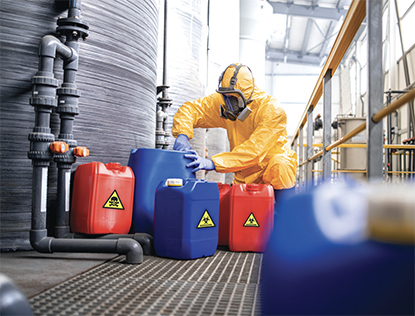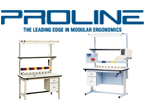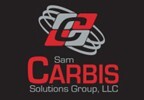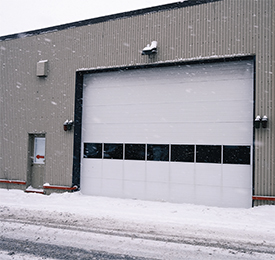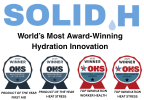January 2026
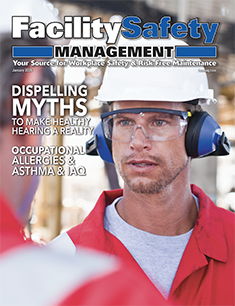 |
Inside the January Issue |
Common Hazardous Material Containers
The improper handling of chemical waste can result in injuries
to employees, damage to the environment, and fines from regulatory
agencies. Hazardous waste containers must comply with
EPA regulations.
The container must be labeled "Hazardous Waste", dated on
the day that waste is first accumulated, and have the constituents
of the container spelled out in full, in English. At the
end of the workday or experiment, be sure that any funnel that
collects waste into a container is taken out of the container and
the container recapped.
To ensure proper management of these containers, follow
these guidelines:
All hazardous waste designated for disposal must be placed
in appropriate glass, metal, or chemically inert, non-reactive,
non-flexible plastic containers with tightly fitting screw caps.
Corrosives should not be placed in metal containers. Leaking, visibly damaged, or rusted containers are not acceptable. Used containers should be clean. Do not refill used reagent containers with potentially incompatible waste chemicals. Open containers or containers with cut glass, aluminum foil, Parafilm, rubber, or cork stoppers are unacceptable. Do not overfill waste containers.
All containers labeled as containing hazardous waste must be
stored in a secondary containment device (i.e., tub or basin) to
prevent environmental contamination in the event of a spill or
leaking container. Each basin must be leakproof and constructed of chemically inert material. It must be capable of containing
either the total volume of the largest waste container in the basin
or 10 percent of the total waste volume in the basin, whichever
is greater.
The exterior of each waste container must be clean and free
from chemical contamination so that labels will adhere to the container.
All markings not pertaining to the actual waste contents
must be completely removed or obliterated.
Waste containers must be kept closed at all times except when
in the process of adding waste to the container. Waste containers
must not be filled to the top. Two inches of space must be left
at the top of every container larger than a quart.
Waste containers must be inspected weekly for leaks and/or
deterioration. If a container is leaking or deteriorating, transfer
its contents to a new, suitable container.
Chemical containers that have been emptied (generally this means drained of their contents by normal means including pouring, pumping, aspirating, etc.) are not regulated as hazardous waste; however, they should be triple-rinsed with water or other suitable solvent and air-dried to ensure that they are free of liquid or other visible chemical residues. Full story »
today's News
‘Safety Break’ encourages Oregon employers, workers to stand down May 13
SALEM, OR -- The Oregon Occupational Safety and Health Division (Oregon OSHA) urges employers and workers across industries to join Oregon's annual Safety Break event for a celebration of the importance of creating and maintaining safe and healthy working conditions.
National Video Contest Inspires Youth to Focus on Workplace Health and Safety
HAMILTON, ON -- The Canadian Centre for Occupational Health and Safety (CCOHS) is inviting students and youth in Canada to enter the 2026 Focus on Safety Youth Video Contest.
HSI Unveils Sky, an AI Assistant for Workplace Safety
FRISCO, TX -- HSI, a provider of workplace safety, compliance, and learning solutions, announced Sky, a new propriety AI-powered assistant designed to help organizations turn safety data into insight, action, and prevention.
PHCC Educational Foundation Expands Scholarship Program with 75 Awards
FALLS CHURCH, VA -- The Plumbing-Heating-Cooling Contractors—National Association (PHCC) Educational Foundation is expanding the number of awards offered through its scholarship program in 2026 to help ease that burden and keep individuals moving forward in their careers.
Bailey Equipment & Intralogistics Brings 75 Years of Material Handling Expertise with Acquisition
NASHVILLE, TN -- Bailey Equipment & Intralogistics, a third-generation, family-owned forklift dealership with more than 75 years of experience, announced its acquisition of Equipment Depot's Washington state operation.

